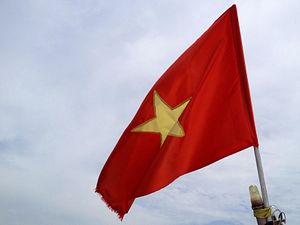The United States has expressed concerns over recent Chinese geological survey activity and “interference” with Vietnam’s activities in disputed waters in the South China Sea.
Morgan Ortagus, a spokesperson for the U.S. Department of State, released a statement on Saturday condemning China’s “repeated provocative actions aimed at the offshore oil and gas development of other claimant states threaten regional energy security and undermine the free and open Indo-Pacific energy market.”
“China’s reclamation and militarization of disputed outposts in the [South China Sea], along with other efforts to assert its unlawful [South China Sea] maritime claims, including the use of maritime militia to intimidate, coerce, and threaten other nations, undermine the peace and security of the region,” the U.S. statement added.
The statement described China’s behavior as “bullying” and called on Beijing to “refrain from engaging in this type of provocative and destabilizing activity.”
The U.S. statement followed a strong statement by the Vietnamese government on Friday demanding that the Chinese survey ship leave the country’s exclusive economic zone. Vessels from the two countries had been engaged in a standoff near an oil block in disputed waters on Vietnam’s continental shelf on Vanguard Bank.
“Over the last several days, the Chinese survey ship, Haiyang Dizhi 8, and its escorts conducted activities in the southern area of the East Sea that violated Vietnam’s exclusive economic zone and continental shelf,” Vietnam’s Foreign Ministry spokesperson Le Thi Thu Hang noted last week.
“Vietnam has made contact with China on multiple occasions via different channels, delivered diplomatic notes to oppose China’s violations, and staunchly demanded China to stop all unlawful activities and withdraw its ships from Vietnamese waters,” the spokesperson’s statement added.
One of the Haiyang Dizhi 8’s escorts was the China Coast Guard vessel Haijing 3901 — one of the China Coast Guard’s largest white hulls and one of the largest coast guard vessels anywhere in the world.
The Chinese side pushed back on Vietnam’s concerns, insisting that the area of the standoff, which falls within Beijing’s so-called nine-dash line claim to most of the South China Sea, was Chinese territory.
“We hope the Vietnamese side can earnestly respect China’s sovereign rights and jurisdiction over the relevant waters, and do not take any move that may complicate matters,” Chinese Foreign Ministry spokesperson Geng Shuang said in response to a question about the dispute.
China and Vietnam, along with the Philippines, Malaysia, Brunei Darussalam, and Taiwan, are claimant states in the South China Sea.

































